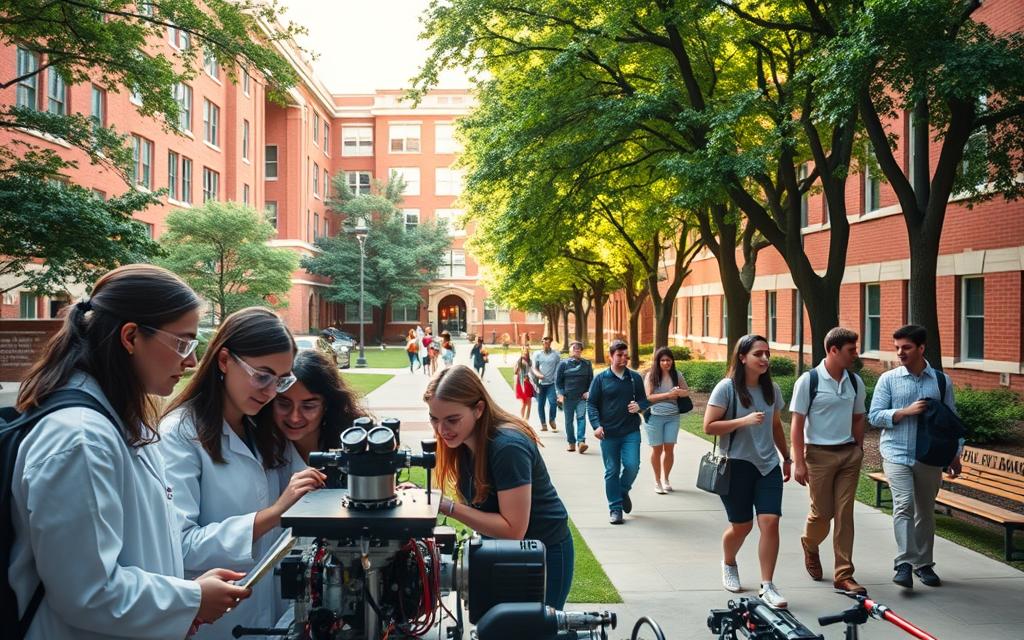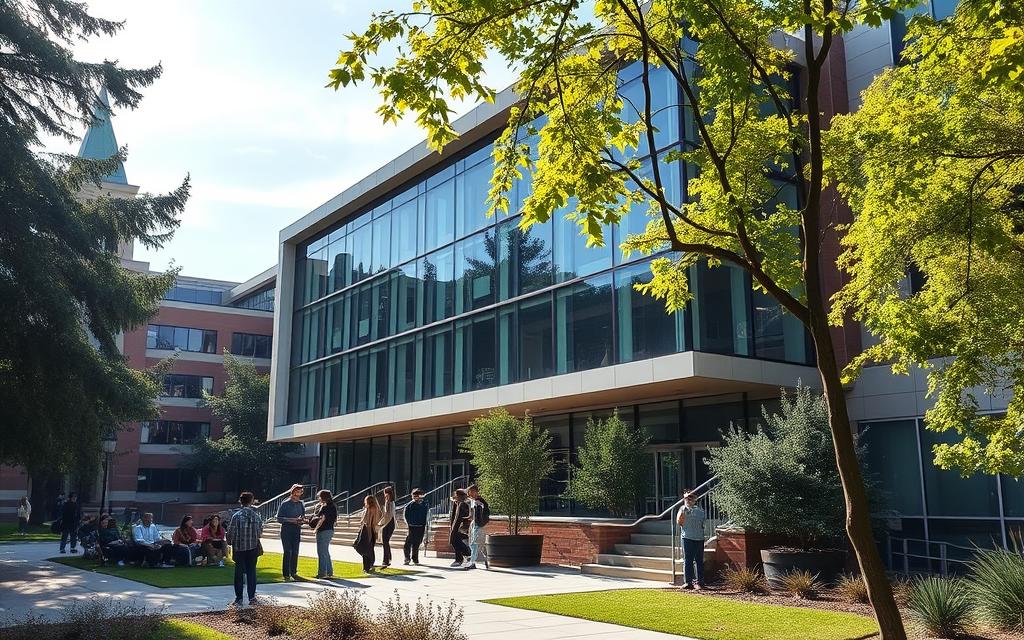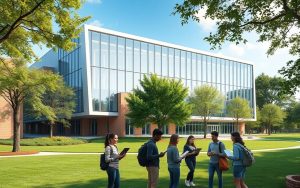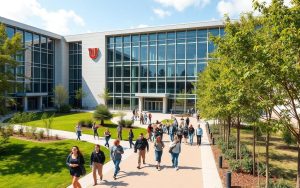Table of Contents
Georgia’s tech industry is booming, and students are increasingly looking at the University of Georgia for quality education in this field. With a 153% surge in undergraduate enrollment over five years, the demand speaks volumes.
The program has earned recognition as a National Center of Academic Excellence in Cyber Defense Research. This designation highlights its commitment to cutting-edge learning and industry relevance.
Graduates have secured roles at top firms like Mailchimp and NCR, showcasing the practical value of their degrees. Employer partnerships further strengthen career opportunities for those enrolled.
Balancing reputation with real-world outcomes, the curriculum prepares students for success in a competitive job market. Let’s dive deeper into what makes this program stand out.
Introduction: UGA’s Growing Influence in Computer Science
The demand for skilled tech professionals has transformed the University of Georgia into a powerhouse for computing education. Over 1,100 undergraduates and 195+ graduate students now pursue degrees here, reflecting a 153% surge in five years.
Atlanta’s status as a top-five tech talent market fuels this growth. Graduates land roles at firms like NCR and Mailchimp, proving the program’s real-world impact.
“UGA’s focus on applied learning bridges the gap between academia and industry,”
notes a local tech leader.
| Year | Undergrad Enrollment | Grad Enrollment |
|---|---|---|
| 2013 | 450 | 120 |
| 2018 | 1,100+ | 195+ |
Founded in 1984, the program evolved into the School of Computing in 2022. Its research strengths include the Institute for Cybersecurity and Privacy, aligning with Georgia’s booming tech sector.
How Prestigious Is UGA’s Computer Science Program? Rankings and Reputation
Rankings reveal how institutions measure up in competitive fields. While not in the top 20 nationally, the University of Georgia holds its own as a respected regional hub for tech education.
National and Regional Rankings
UGA’s CAE-R designation in cybersecurity (valid through 2022) signals rigor in defense research. This federal recognition places it among elite universities with specialized training.

CSRankings.org data highlights strengths in AI and systems research. Smaller class sizes foster mentorship—a key advantage over larger state university rivals.
Comparison to Peer Institutions
- Georgia Tech: Higher research output but more competitive for undergrads.
- Emory: Strong in theory, but UGA offers broader industry ties.
Graduates benefit from Atlanta’s tech boom, with 85% securing jobs within six months. As one alum noted:
“The program’s blend of theory and hands-on projects prepared me for real-world challenges.”
While not Ivy-tier, UGA delivers value through accessibility and regional clout. Its growing reputation mirrors Georgia’s tech sector ascent.
Key Strengths of UGA’s Computer Science Department
Cutting-edge research and dedicated faculty define the department’s growing appeal. With a 60% increase in graduate enrollment and over 50 active projects annually, the program blends academic rigor with real-world impact.
Undergraduate and Graduate Enrollment Trends
Students are choosing UGA in record numbers. Undergraduate admissions surged 153% since 2013, while graduate numbers jumped 60% in five years.
A 20:1 student-faculty ratio in advanced courses ensures personalized mentorship. This growth fuels expanded electives in AI and cybersecurity.
Faculty Expertise and Research Contributions
Dr. Thiab Taha, a leader in curriculum design, helms initiatives backed by NSF grants. Faculty specialize in:
- Machine learning: Algorithms for healthcare diagnostics.
- Bioinformatics: Genomic data analysis tools.
Their work earned $3.2M in federal funding last year. As one student noted:
“Professors bridge theory with Atlanta’s tech needs—our projects often turn into internships.”
Hands-On Learning: Research and Internship Opportunities
UGA bridges classroom theory with real-world tech challenges through immersive programs. Students engage in projects that solve actual industry problems, from cybersecurity to AI development.

Undergraduate Research Programs
The Lori Kittle Scholarship Fund fuels innovative research initiatives. Summer programs pair learners with faculty mentors tackling machine learning and bioinformatics.
One participant shared:
“My team’s healthcare algorithm project landed me an internship at CDC.”
Industry Partnerships and Internships
85% of seniors complete internships at firms like Google, Amazon, and AT&T. UGA’s co-op program blends academic credit with paid experience at NCR or Mailchimp.
- UGA Hacks: 300+ annual participants, with winning teams launching startups.
- Home Depot Collaboration: Students optimize supply-chain algorithms.
These opportunities ensure graduates enter the industry with proven skills and networks.
Curriculum and Specializations: What Sets UGA Apart
Specialized tracks prepare students for emerging fields like *artificial intelligence* and *cybersecurity*. The curriculum balances foundational theory with industry-driven projects, ensuring graduates excel in fast-evolving tech roles.

Core Courses and Elective Offerings
Required classes cover algorithms, data structures, and systems design. Electives dive deeper into niches like:
- Machine Learning: 15+ dedicated courses, including NLP and computer vision.
- Agricultural AI Applications: A unique offering leveraging Georgia’s farming economy.
An industry advisory board updates the degree paths annually. As one professor noted:
“Our capstone projects with sponsors like Home Depot bridge classroom learning and real-world problem-solving.”
Focus Areas Like AI and Cybersecurity
The 2020 *cybersecurity* concentration includes labs with threat simulation tools. AI students access GPU clusters for deep learning research.
Dual degree options with Terry College of Business merge tech and leadership training. This flexibility attracts students targeting roles from startups to Fortune 500 firms.
Student Life: Clubs, Hackathons, and Community
Beyond academics, UGA fosters a vibrant tech culture through hands-on events and tight-knit communities. The campus buzzes with coding competitions, mentorship programs, and collaborative projects that enrich the student experience.

Extracurriculars That Spark Innovation
The Data Dawgs club unites 400+ members in data science workshops and networking sessions. Annual hackathons like UGA Hacks draw 300+ participants, with winning teams often launching startups.
“My team’s IoT project at UGA Hacks landed us interviews with Atlanta tech firms,”
says student Muhammed Ahmed. The ACM chapter prepares members for coding interviews through mock competitions.
A Supportive Learning Ecosystem
Initiatives like Women in Tech create mentorship opportunities, pairing learners with industry leaders. Unlike cutthroat peer institutions, UGA emphasizes collaboration—92% of students praise this inclusive community in surveys.
Cutting-edge facilities, including IoT-enabled labs, let learners test ideas in real-world environments. Alumni spanning 35+ countries frequently return to judge competitions or host workshops, bridging classroom and career experience.
Career Outcomes: Where UGA Computer Science Graduates Go
Employers actively recruit from UGA, reflecting the quality of its tech talent. With a 94% job placement rate within six months, graduates secure roles at leading firms nationwide. The average starting salary of $82,000 outperforms many regional peers.
Top Employers Hiring UGA Talent
Fortune 500 companies dominate recruitment, including:
- NCR Corporation: 43 hires since 2020
- Mailchimp: 28 alumni in engineering roles
- Delta Airlines: Tech operations team
Maja Culum’s journey exemplifies this success. After interning at NCR through UGA’s co-op program, she now leads a fintech development team.
“The hands-on projects with industry partners gave me a competitive edge,”
she notes.
Beyond First Jobs: Long-Term Growth
15% of alumni pursue advanced degrees at institutions like Georgia Tech and MIT. Others launch startups—UGA ranks top-20 among public schools for tech entrepreneurship.
Salaries climb to $120K+ within five years, matching national averages for mid-career professionals. This growth cements the program’s value in a booming tech economy.
Industry Connections and Atlanta’s Tech Hub Advantage
Atlanta’s thriving tech ecosystem creates unparalleled opportunities for learners. With 120+ companies at annual career fairs, students connect directly with giants like Microsoft and Cisco.
Local and National Employer Networks
Major employers within a 70-mile radius include:
- NCR Corporation (Headquarters in Atlanta)
- Delta Airlines
- Home Depot’s tech innovation center
Georgia’s $1B+ investments in AI and cybersecurity fuel these partnerships. The state university’s advisory board includes execs from Fortune 500 firms, shaping curriculum to match industry needs.
UGA’s Role in Georgia’s Tech Growth
The Innovation Hub co-locates startups with corporate R&D teams. Alumni-founded companies like PartPic (acquired by Amazon) showcase this synergy.
“Our corporate training programs with UGA upskill 300+ engineers annually,”
notes a Cisco Systems director. Atlanta’s 18% job growth in tech ensures graduates tap into a booming market.
Challenges and Considerations for Prospective Students
Prospective learners should weigh both opportunities and challenges before committing. While the program offers robust training, its popularity means competitive entry for high-demand courses. A 22% waitlist rate for electives like AI and cybersecurity requires early registration strategies.
Navigating Program Rigor
With a 65% four-year graduation rate, students must plan their academic journey carefully. Core courses in algorithms and systems design demand 15–20 hours weekly per class. Transfer learners face additional hurdles—only 40% complete degrees on time due to credit alignment delays.
Faculty recommend these strategies:
- Time blocking: Dedicate 3-hour study sessions for complex topics.
- Peer cohorts: Join study groups to tackle project-based assignments.
Merging Theory and Practice
The required 120-hour internship ensures hands-on experience, but balancing coursework with externships tests time management skills. Alumni note that foundational classes like discrete math are critical for mastering advanced topics.
| Course Level | Weekly Time Commitment |
|---|---|
| Introductory (1000-level) | 8–10 hours |
| Advanced (4000-level) | 12–18 hours |
As one graduate shared:
“Prioritizing labs over lectures helped me apply concepts faster—I landed a cybersecurity role right after finals.”
Conclusion: Is UGA’s Computer Science Program Right for You?
Choosing the right academic path depends on your goals. The University of Georgia stands out with strong industry ties and a growing reputation in tech. While not as nationally ranked as MIT or Stanford, it offers practical advantages for those targeting the Southeast job market.
Self-starters thrive here. Hands-on projects with firms like NCR and Home Depot build real-world skills. The curriculum balances theory with applied learning, preparing students for immediate career impact.
Graduates enjoy solid ROI—94% job placement and $82K starting salaries. For learners seeking affordability, regional connections, and a collaborative environment, this program delivers.
Next steps? Explore course specializations, attend virtual info sessions, or speak with current students. Your future in tech starts with the right fit.
FAQ
How does UGA’s computer science program rank nationally?
The University of Georgia’s program is recognized among top public institutions, with strong rankings in research output and student outcomes.
What research opportunities are available for undergraduates?
Students can join projects in artificial intelligence, cybersecurity, and data science through faculty-led initiatives and funded programs.
Does the department have strong industry connections?
Yes, partnerships with Atlanta-based tech firms and national organizations provide internships, networking events, and job placements.
Are there specialized tracks within the curriculum?
Focus areas include machine learning, software engineering, and computational systems, allowing students to tailor their studies.
What career support does UGA offer computer science majors?
The university hosts career fairs, resume workshops, and employer panels, with graduates securing roles at leading companies.
How competitive is admission to the program?
Enrollment is selective, emphasizing academic performance, technical skills, and extracurricular involvement in STEM fields.
Can students participate in hackathons or coding clubs?
Organizations like UGA Hacks and Data Dawgs offer hands-on events, competitions, and peer collaboration.
What’s the faculty-to-student ratio in advanced courses?
Smaller class sizes in upper-level electives ensure personalized mentorship from professors with industry and research expertise.









